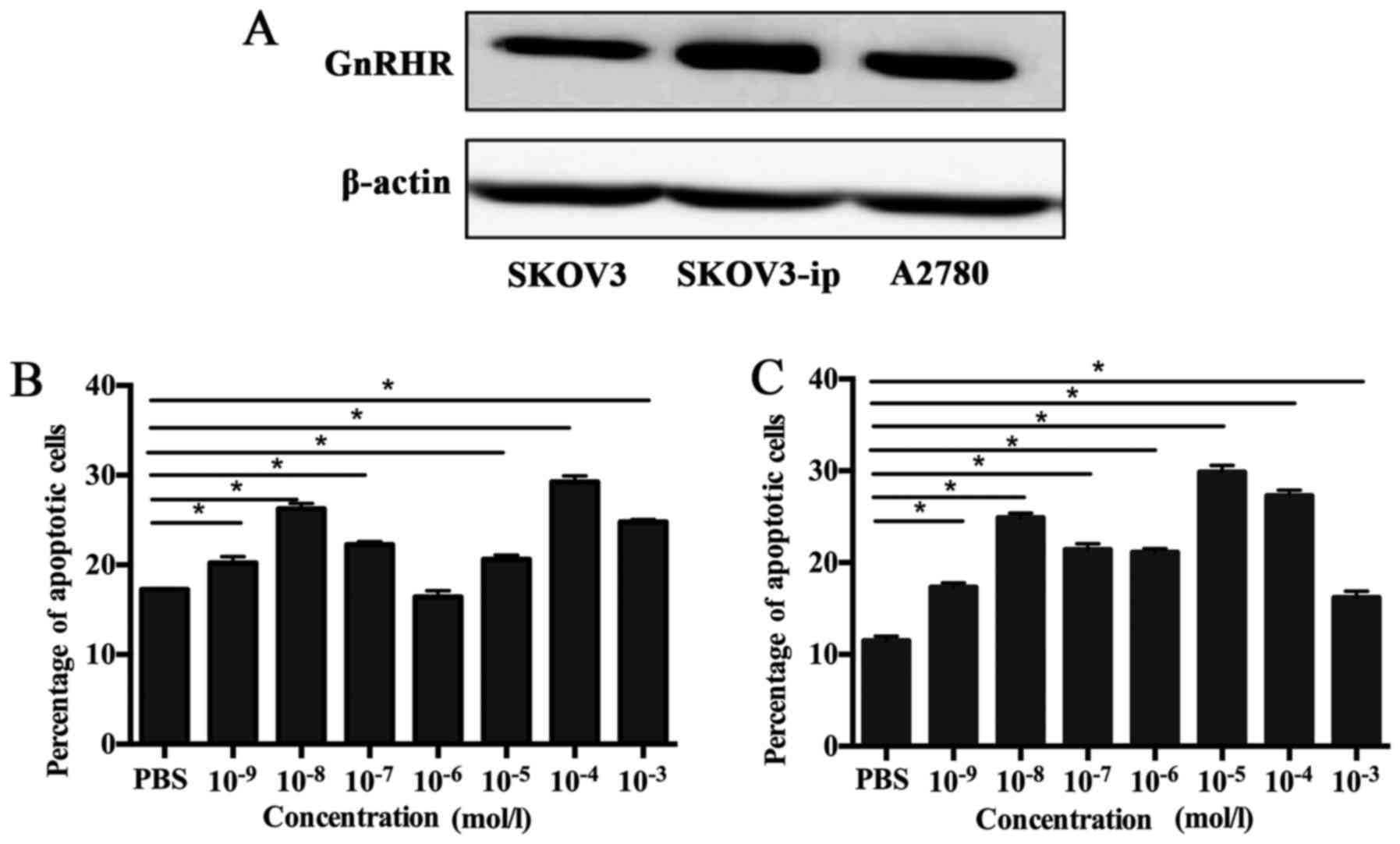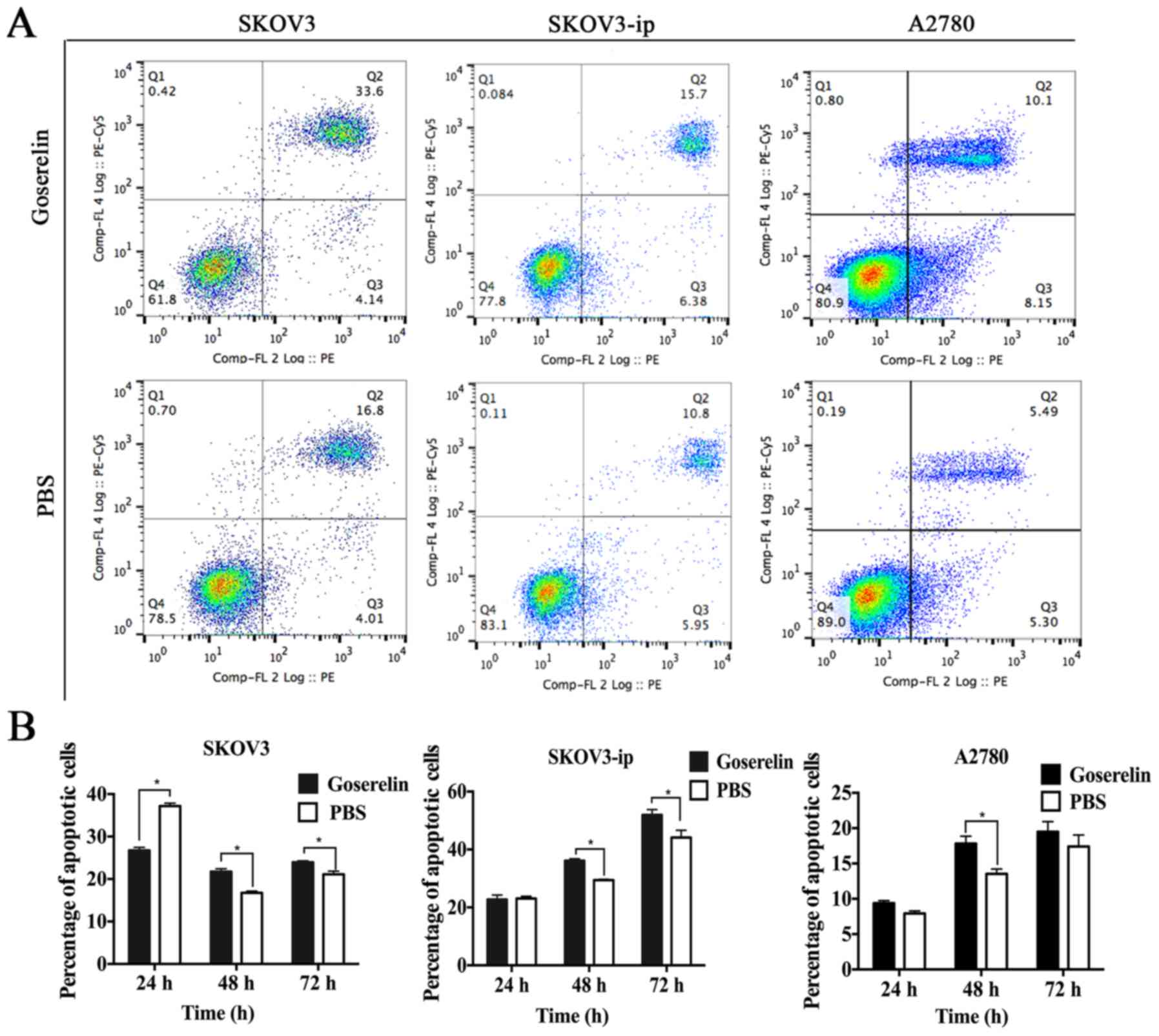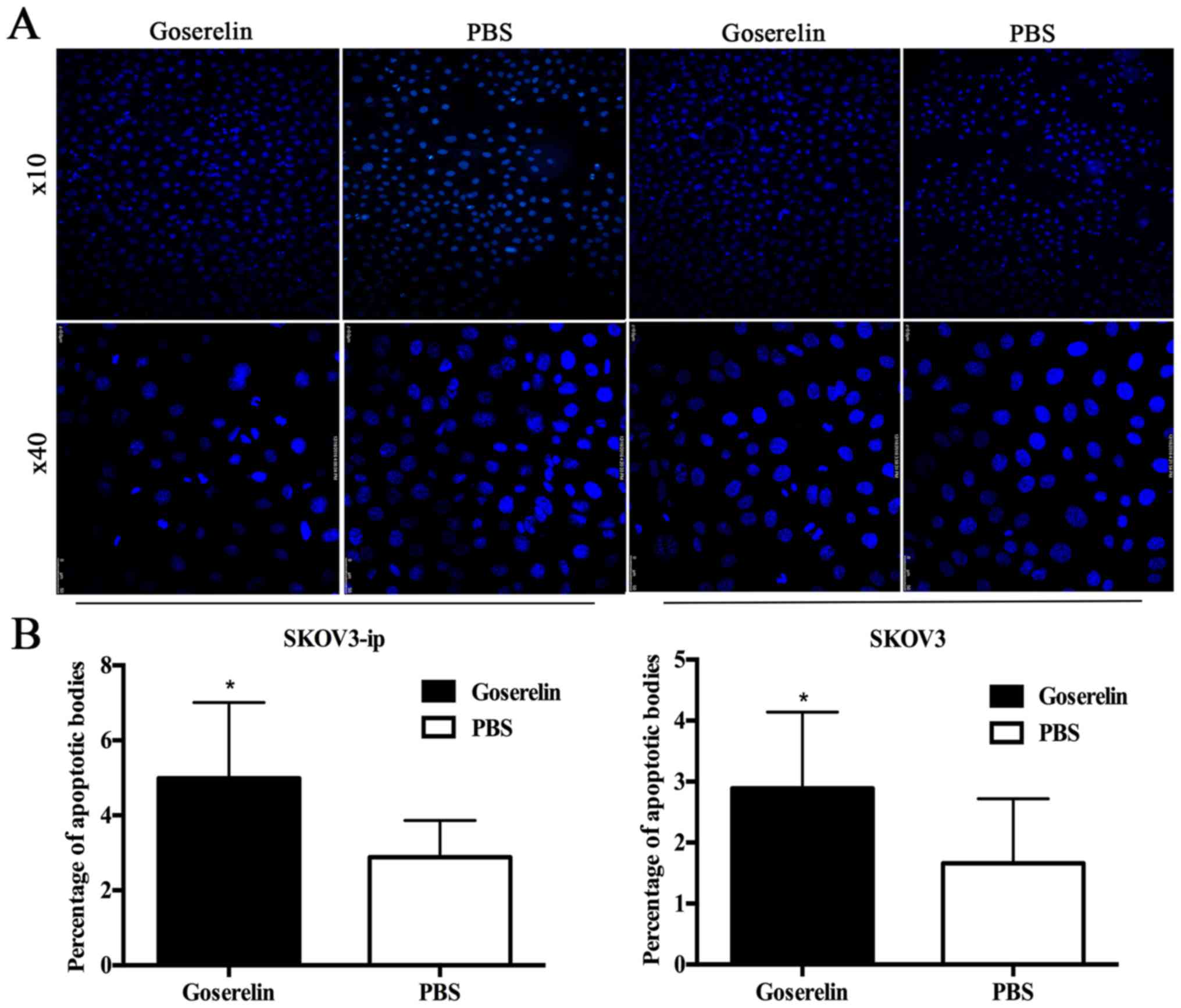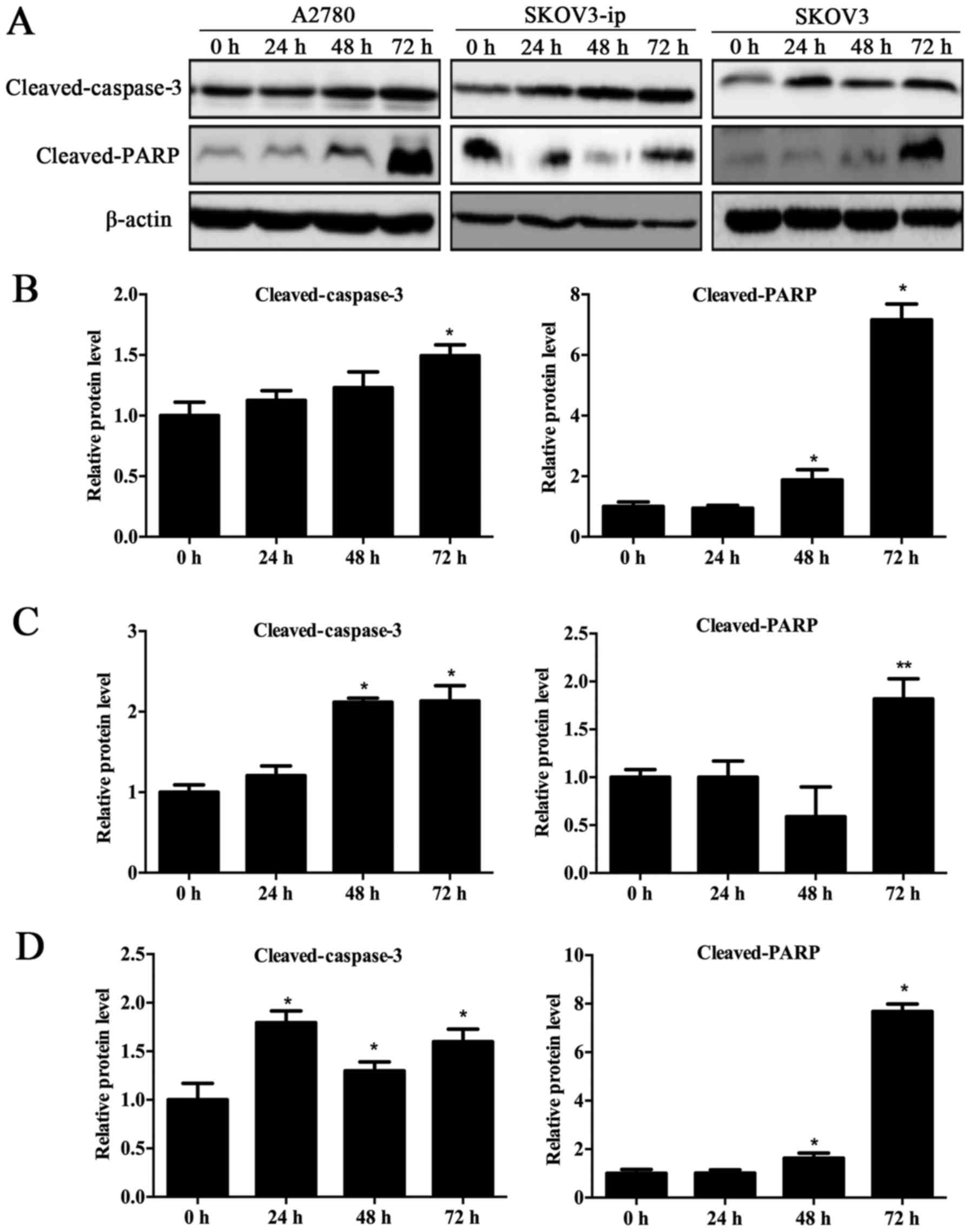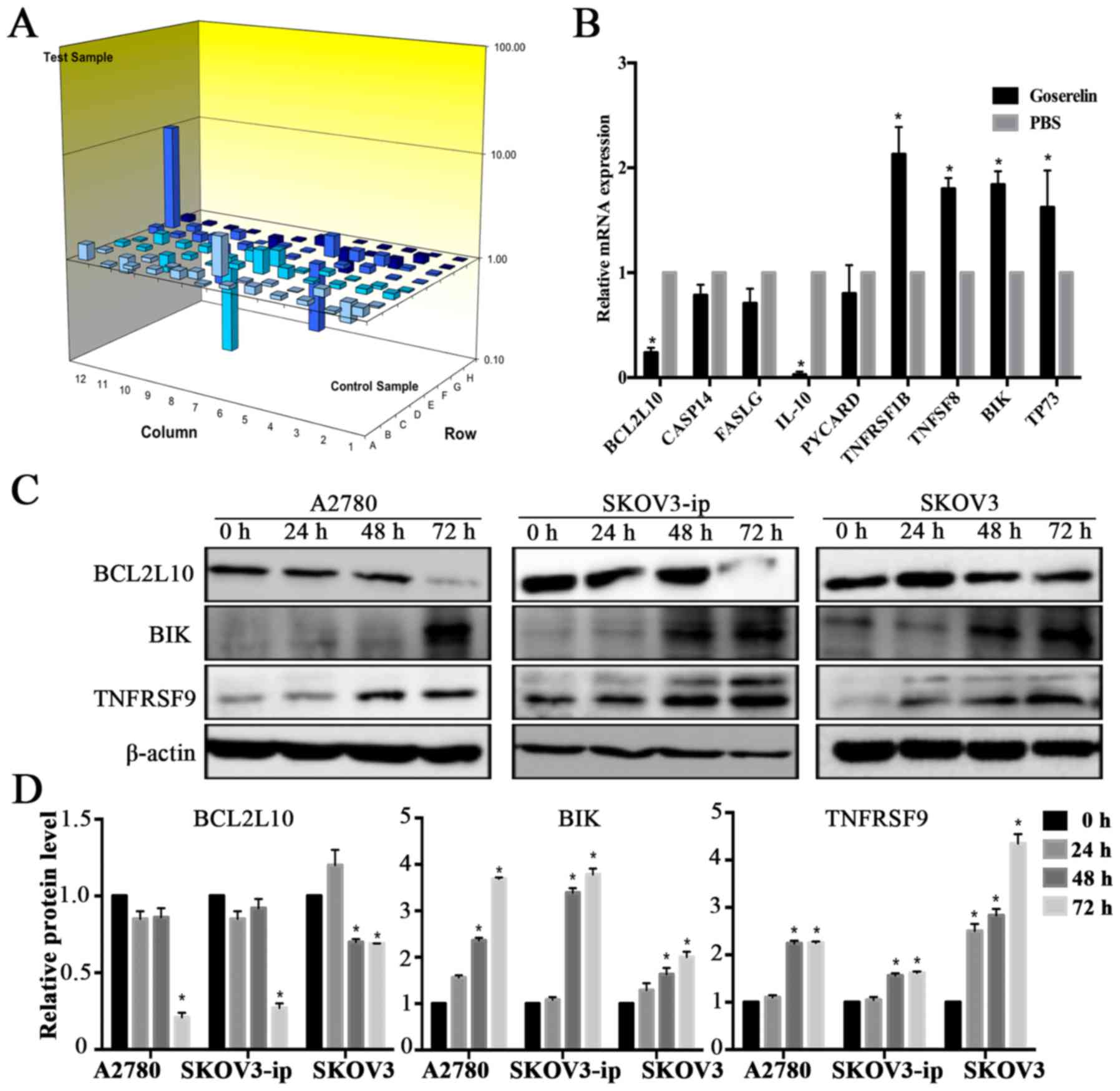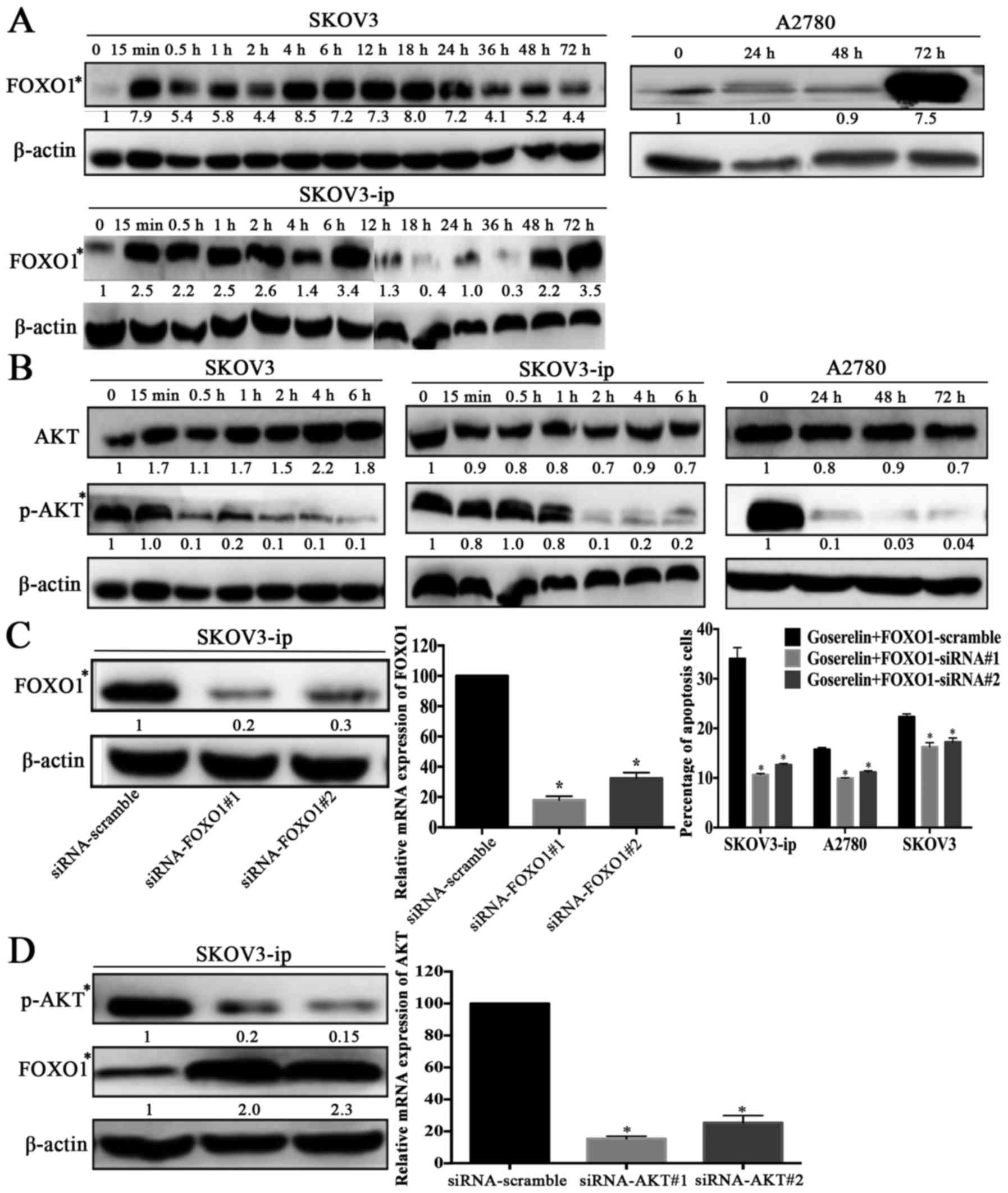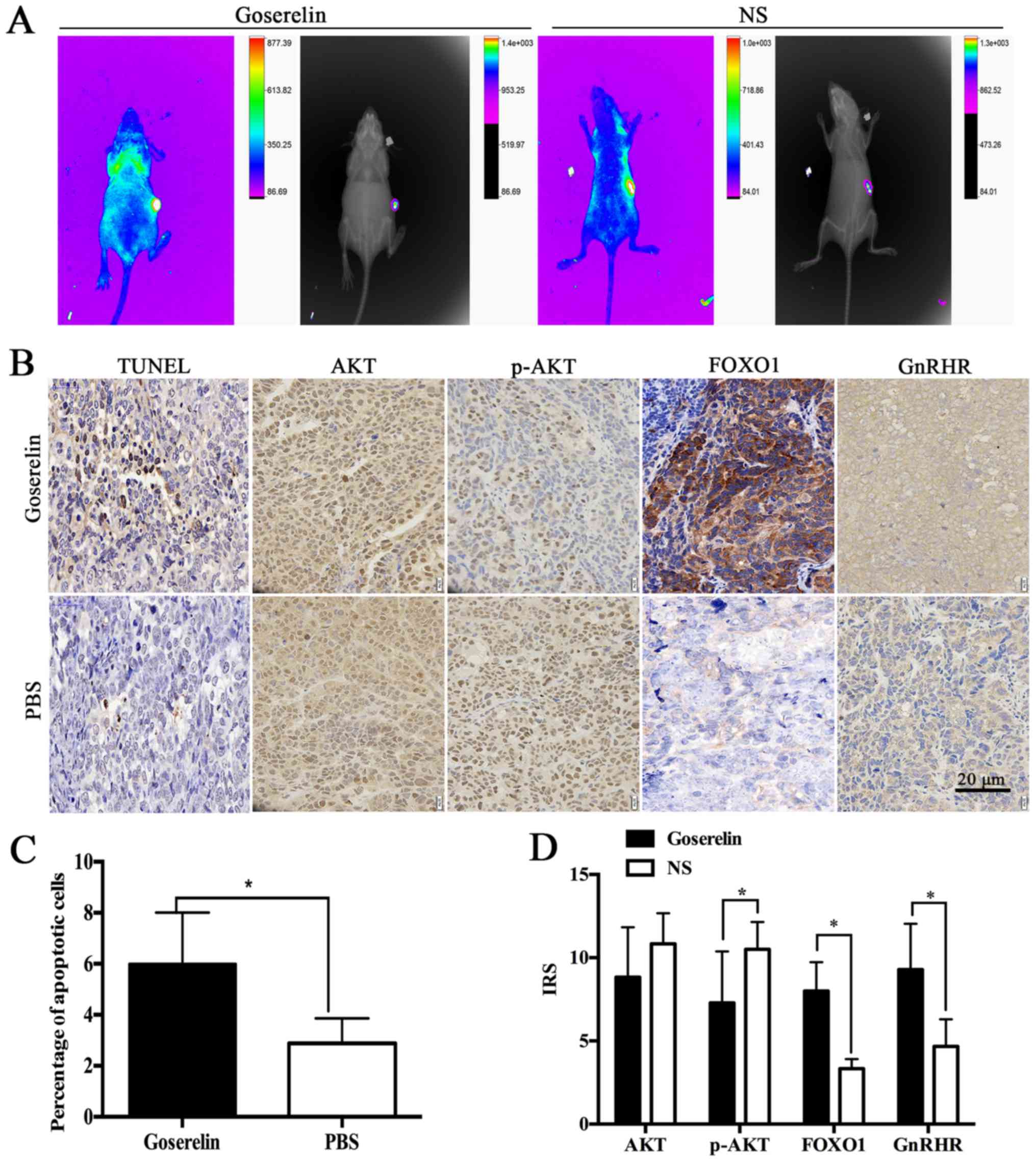|
1
|
Hemminki K, Sundquist J and Brandt A:
Incidence and mortality in epithelial ovarian cancer by family
history of any cancer. Cancer. 117:3972–3980. 2011. View Article : Google Scholar : PubMed/NCBI
|
|
2
|
Rustin G, van der Burg M, Griffin C, Qian
W and Swart AM: Early versus delayed treatment of relapsed ovarian
cancer. Lancet. 377:380–381. 2011. View Article : Google Scholar : PubMed/NCBI
|
|
3
|
Chen W, Zheng R, Baade PD, Zhang S, Zeng
H, Bray F, Jemal A, Yu XQ and He J: Cancer statistics in China,
2015. CA Cancer J Clin. 66:115–132. 2016. View Article : Google Scholar : PubMed/NCBI
|
|
4
|
Casagrande JT, Louie EW, Pike MC, Roy S,
Ross RK and Henderson BE: ‘Incessant ovulation’ and ovarian cancer.
Lancet. 2:170–173. 1979. View Article : Google Scholar : PubMed/NCBI
|
|
5
|
Millar RP: GnRHs and GnRH receptors. Anim
Reprod Sci. 88:5–28. 2005. View Article : Google Scholar : PubMed/NCBI
|
|
6
|
Leung PC and Choi JH: Endocrine signaling
in ovarian surface epithelium and cancer. Hum Reprod Update.
13:143–162. 2007. View Article : Google Scholar : PubMed/NCBI
|
|
7
|
Brekelmans CT: Risk factors and risk
reduction of breast and ovarian cancer. Curr Opin Obstet Gynecol.
15:63–68. 2003. View Article : Google Scholar : PubMed/NCBI
|
|
8
|
Kim HJ, Yoon TI, Chae HD, Kim JE, Chae EY,
Yu JH, Sohn G, Ko BS, Lee JW, Son BH, et al: Concurrent
gonadotropin-releasing hormone agonist administration with
chemotherapy improves neoadjuvant chemotherapy responses in young
premenopausal breast cancer patients. J Breast Cancer. 18:365–370.
2015. View Article : Google Scholar : PubMed/NCBI
|
|
9
|
Hoda MR, Kramer MW, Merseburger AS and
Cronauer MV: Androgen deprivation therapy with Leuprolide acetate
for treatment of advanced prostate cancer. Expert Opin
Pharmacother. 18:105–113. 2017. View Article : Google Scholar : PubMed/NCBI
|
|
10
|
Zhang Z, Jia L, Feng Y and Zheng W:
Overexpression of follicle-stimulating hormone receptor facilitates
the development of ovarian epithelial cancer. Cancer Lett.
278:56–64. 2009. View Article : Google Scholar : PubMed/NCBI
|
|
11
|
Zhang Z, Liao H, Chen X, Zheng Y, Liu Y,
Tao X, Gu C, Dong L, Duan T, Yang Y, et al: Luteinizing hormone
upregulates survivin and inhibits apoptosis in ovarian epithelial
tumors. Eur J Obstet Gynecol Reprod Biol. 155:69–74. 2011.
View Article : Google Scholar : PubMed/NCBI
|
|
12
|
So WK, Cheng JC, Poon SL and Leung PC:
Gonadotropin-releasing hormone and ovarian cancer: A functional and
mechanistic overview. FEBS J. 275:5496–5511. 2008. View Article : Google Scholar : PubMed/NCBI
|
|
13
|
Meyer C, Sims AH, Morgan K, Harrison B,
Muir M, Bai J, Faratian D, Millar RP and Langdon SP: Transcript and
protein profiling identifies signaling, growth arrest, apoptosis,
and NF-κB survival signatures following GNRH receptor activation.
Endocr Relat Cancer. 20:123–136. 2013. View Article : Google Scholar : PubMed/NCBI
|
|
14
|
Zhang Y, Ding JX, Tao X, Lu ZY, Wang JJ,
Feng WW and Hua KQ: Goserelin can inhibit ovarian cancer
proliferation and simultaneously protect ovarian function from
cisplatin: An in vitro and in vivo study. J Chemother. 25:96–103.
2013. View Article : Google Scholar : PubMed/NCBI
|
|
15
|
Aguilar-Rojas A, Pérez-Solis MA and
Maya-Núñez G: The gonadotropin-releasing hormone system:
Perspectives from reproduction to cancer (Review). Int J Oncol.
48:861–868. 2016. View Article : Google Scholar : PubMed/NCBI
|
|
16
|
Yano T, Pinski J, Halmos G, Szepeshazi K,
Groot K and Schally AV: Inhibition of growth of OV-1063 human
epithelial ovarian cancer xenografts in nude mice by treatment with
luteinizing hormone-releasing hormone antagonist SB-75. Proc Natl
Acad Sci USA. 91:pp. 7090–7094. 1994; View Article : Google Scholar : PubMed/NCBI
|
|
17
|
Dondi D, Moretti RM, Montagnani Marelli M,
Pratesi G, Polizzi D, Milani M, Motta M and Limonta P:
Growth-inhibitory effects of luteinizing hormone-releasing hormone
(LHRH) agonists on xenografts of the DU 145 human
androgen-independent prostate cancer cell line in nude mice. Int J
Cancer. 76:506–511. 1998. View Article : Google Scholar : PubMed/NCBI
|
|
18
|
Friedrichs K, Gluba S, Eidtmann H and
Jonat W: Overexpression of p53 and prognosis in breast cancer.
Cancer. 72:3641–3647. 1993. View Article : Google Scholar : PubMed/NCBI
|
|
19
|
van der Vos KE and Coffer PJ: The
extending network of FOXO transcriptional target genes. Antioxid
Redox Signal. 14:579–592. 2011. View Article : Google Scholar : PubMed/NCBI
|
|
20
|
Cardozo T and Pagano M: The SCF ubiquitin
ligase: Insights into a molecular machine. Nat Rev Mol Cell Biol.
5:739–751. 2004. View
Article : Google Scholar : PubMed/NCBI
|
|
21
|
Coomans de Brachène A and Demoulin JB:
FOXO transcription factors in cancer development and therapy. Cell
Mol Life Sci. 73:1159–1172. 2016. View Article : Google Scholar : PubMed/NCBI
|
|
22
|
Gründker C, Schulz K, Günthert AR and
Emons G: Luteinizing hormone-releasing hormone induces nuclear
factor kappaB-activation and inhibits apoptosis in ovarian cancer
cells. J Clin Endocrinol Metab. 85:3815–3820. 2000. View Article : Google Scholar : PubMed/NCBI
|
|
23
|
Tsitsipatis D, Klotz LO and Steinbrenner
H: Multifaceted functions of the forkhead box transcription factors
FoxO1 and FoxO3 in skin. Biochim Biophys Acta. 1861:1057–1064.
2017. View Article : Google Scholar : PubMed/NCBI
|
|
24
|
Carbajo-Pescador S, Mauriz JL,
García-Palomo A and González-Gallego J: FoxO proteins: Regulation
and molecular targets in liver cancer. Curr Med Chem. 21:1231–1246.
2014. View Article : Google Scholar : PubMed/NCBI
|
|
25
|
Procaccia S, Ordan M, Cohen I,
Bendetz-Nezer S and Seger R: Direct binding of MEK1 and MEK2 to AKT
induces Foxo1 phosphorylation, cellular migration and metastasis.
Sci Rep. 7:430782017. View Article : Google Scholar : PubMed/NCBI
|
|
26
|
Fu Z and Tindall DJ: FOXOs, cancer and
regulation of apoptosis. Oncogene. 27:2312–2319. 2008. View Article : Google Scholar : PubMed/NCBI
|
|
27
|
Ho KK, Myatt SS and Lam EW: Many forks in
the path: Cycling with FoxO. Oncogene. 27:2300–2311. 2008.
View Article : Google Scholar : PubMed/NCBI
|
|
28
|
Brunet A, Bonni A, Zigmond MJ, Lin MZ, Juo
P, Hu LS, Anderson MJ, Arden KC, Blenis J and Greenberg ME: Akt
promotes cell survival by phosphorylating and inhibiting a Forkhead
transcription factor. Cell. 96:857–868. 1999. View Article : Google Scholar : PubMed/NCBI
|
|
29
|
Reagan-Shaw S and Ahmad N: RNA
interference-mediated depletion of phosphoinositide 3-kinase
activates forkhead box class O transcription factors and induces
cell cycle arrest and apoptosis in breast carcinoma cells. Cancer
Res. 66:1062–1069. 2006. View Article : Google Scholar : PubMed/NCBI
|
|
30
|
Prasad SB, Yadav SS, Das M, Govardhan HB,
Pandey LK, Singh S, Pradhan S and Narayan G: Down regulation of
FOXO1 promotes cell proliferation in cervical cancer. J Cancer.
5:655–662. 2014. View
Article : Google Scholar : PubMed/NCBI
|















